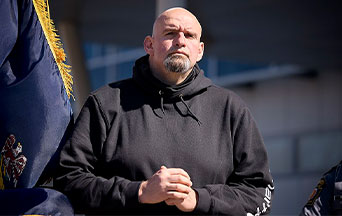
Photo: © Governor Tom Wolf, CC BY 2.0, Image Cropped
Sen. John Fetterman ignited a firestorm over what is proper to wear in the United States Senate when he appeared in a hoodie and basketball shorts. Even the most casual American observers were struck by the inappropriateness of it all.
Senate majority leader Chuck Schumer supported his colleague by instructing the chamber’s sergeant-at-arms to stop enforcing the Senate dress code in deference to the Pennsylvanian’s challenge. Bowing to pressure, the US Senate has passed a resolution overturning the lax dress by formalizing business attire as the proper dress code.
The move to laxity shocked many people as a bridge too far. The reversal proves that there must be some place to escape from the tyranny of the informal. By giving up its code, the august chamber would lose something of its civility, courtesy and decorum.
Like it or not, clothes represent the dignity of the wearer. Human dignity demands that clothes modestly cover the body. The variety of attire corresponds to the wearer’s offices, functions and activities. Thus, senators follow a dress code to honor their office and project a climate of respectability, decency and gravitas needed to legislate.
However, the sexual revolution of the sixties destroyed dress codes, making how one dresses a matter of feeling, not principle. Clothing—the lack of it, its tears and rips, its immodest exposures and its informality—is not the issue in the Fetterman case. Most people tolerate these innovations.
Instead, the issue is the willingness to admit that some places demand clothing that reflects a sense of modesty, decency and decorum.
Thus, the Fetterman debate opens a small breach for a consideration of a higher order.
If shorts and hoodies are inappropriate in the Senate, what other settings might require proper attire? One obvious case is Holy Mass, where so many wear the equivalent of the Fetterman outfit.
To be consistent, those who lament the declining standards in the Senate should also grieve for what passes for fashion in the church pews. The matter of divine worship is much more important than legislation.
Eternal and Natural Law: The Foundation of Morals and Law
If the proceedings of the Senate Judiciary Committee demand a dress code, how much more so does the transubstantiation of bread and wine into the Body, Blood, Soul, and Divinity of Our Lord Jesus Christ?
The worshiper witnesses the unbloody renewal of the Holy Sacrifice of Calvary that secured humanity’s redemption. Out of respect for this august mystery, people, like the vested priest, should manifest their love and respect for the Savior by dressing up as best they can to celebrate this great mystery. It is according to the dignity of the acts taking place.
Worshippers should see dressing well not as an inconvenience but as an act of love of God. It takes effort to be pleasing in the sight of the Most High. The emphasis should be on God, not self. Those who love are always willing to sacrifice for the object of their devotion.
One objection from the casual worshiper is that God loves people as they are and welcomes them no matter how they are dressed.
Such a position ignores the lessons of the Scriptures. Christ uses the physical image of the wedding garment in his parable to indicate a proper way of presenting oneself before God—spiritually and materially.
Our Lord pointed out the lilies of the field as an example of how God provides those who confide in Him with attire that is more splendorous than that of Solomon in all his glory. (See Matt. 6:29.)
God manifests Himself to humanity through a universe of immense and marvelous beauty. He is that “beauty, so ancient and so new” that captivated Saint Augustine. The Church reciprocates this epiphany by surrounding worship with beauty and splendor.
Just as those who see Fetterman fashions as a means to destroy the respectability of the Senate, so also similar fashions damage the credibility of the Church. Indeed, is it any wonder that so few believe in the Real Presence when people present themselves as if going to a basketball game? The message that Fetterman fashion in Church sends to youth is that nothing important is happening there.
The Fetterman controversy suggests that externals can be important. Love trumps comfort. Maybe it is time to admit that some places are sacred—and one of them is inside church.

